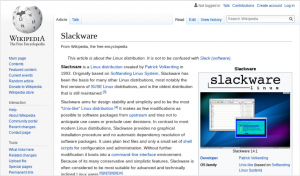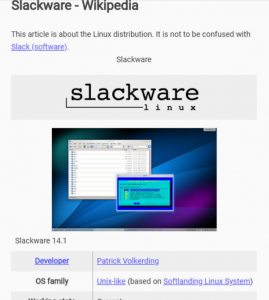 There was an update to Chromium browser code this week as announced a few days ago by Google. I built new Slackware packages for Chromium 74.0.3729.169 and uploaded them earlier this week to slackware.com and slackware.nl (or you can use any mirror site of course).
There was an update to Chromium browser code this week as announced a few days ago by Google. I built new Slackware packages for Chromium 74.0.3729.169 and uploaded them earlier this week to slackware.com and slackware.nl (or you can use any mirror site of course).
There were two intermediate updates to Chromium 74 which I did not compile & package. Both versions address a couple of security issues (CVE’s), but at the time I was unable to work a computer. It’s therefore a good idea to upgrade to this new package.
 Also this week, the Document Foundation released version 6.2.4 of their office suite LibreOffice. I have built and uploaded sets of packages for Slackware 14.2 and also for -current, 32bits and 64bits.
Also this week, the Document Foundation released version 6.2.4 of their office suite LibreOffice. I have built and uploaded sets of packages for Slackware 14.2 and also for -current, 32bits and 64bits.
I had some issues with the visibility of LibreOffice icons in its toolbar recently (last couple of versions of LibreOffice that I built actually).
I am using LibreOffice on Slackare-current with Plasma5 and in the profile script “/etc/profile.d/libreoffice.sh” I have uncommented this line because the GTK+3 widget set usually gives the best possible interface for LO in a Plasma5 desktop:
export SAL_USE_VCLPLUGIN=gtk3
However, icons would not show unless you moved the mouse across them, or sometimes even that would not work. In other words, it made working with LO impossible unless I switched the widget support to “generic’ by uncommenting “export SAL_USE_VCLPLUGIN=gen” in aformentioned profile script instead. But that results in a butt-ugly interface.
By chance I found out that this is caused by a setting in LibreOffice itself. Go to “Tools > Options > Libreoffice > View > Icon Style” and I noticed that the style was set to “Automatic (Breeze)”. I selected “Elementary” instead and voila, I had a working toolbar with visible icons again. For some reason, the integration of GTK+3 applications in Plasma5′ QT5 based interface using the ‘breeze-gtk” package is not fully compatible with the LibreOffice icon handling.
Just so you know.

And finally, there were fresh security updates on the Adobe website for their Flash player plugin. The new version 32.0.0.192 which was released last week (but I missed it) was announced in a security bulletin. I built the packages for the Chromium-compatible and Mozilla-compatible browsers so that you can visit Flash-based web sites safely again (or of course you abandon the use of Flash entirely).
Who is still using these Flash plugin packages?
Where to find my packages? In any case, on these three sites. And slackware.nl as well as slackware.uk also offer rsync access:
Have fun! Eric
![]() There was a new Chromium source release last week, but there were other software releases that had priority to get packages out the door. Therefore I could only chromium packages this weekend.
There was a new Chromium source release last week, but there were other software releases that had priority to get packages out the door. Therefore I could only chromium packages this weekend.



 Also this week, the
Also this week, the 
Recent comments